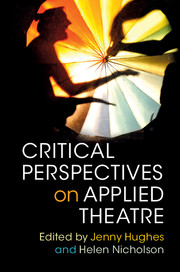Book contents
- Frontmatter
- Contents
- List of figures
- List of contributors
- 1 Applied theatre: ecology of practices
- PART I HISTORIES AND CULTURAL MEMORIES
- 2 Toward a historiography of the absent: on the late pasts of applied theatre and community performance
- 3 A pre-history of applied theatre: work, house, perform
- 4 Applied theatre and cultural memory in East and Southeast Asia
- 5 Dear Nise: method, madness and artistic occupation at a psychiatric hospital in Rio de Janeiro
- PART II PLACE, COMMUNITY AND ENVIRONMENT
- PART III POETICS AND PARTICIPATION
- Notes
- Index
- References
4 - Applied theatre and cultural memory in East and Southeast Asia
from PART I - HISTORIES AND CULTURAL MEMORIES
Published online by Cambridge University Press: 05 April 2016
- Frontmatter
- Contents
- List of figures
- List of contributors
- 1 Applied theatre: ecology of practices
- PART I HISTORIES AND CULTURAL MEMORIES
- 2 Toward a historiography of the absent: on the late pasts of applied theatre and community performance
- 3 A pre-history of applied theatre: work, house, perform
- 4 Applied theatre and cultural memory in East and Southeast Asia
- 5 Dear Nise: method, madness and artistic occupation at a psychiatric hospital in Rio de Janeiro
- PART II PLACE, COMMUNITY AND ENVIRONMENT
- PART III POETICS AND PARTICIPATION
- Notes
- Index
- References
Summary
A person standing in the downtown urban streets of Singapore, Hong Kong or Taiwan is surrounded by similar globally branded stores and coffee shops, and distinguishing locations can be difficult. A sense of placelessness overwhelms and bewilders both local inhabitants and travellers. Local inhabitants search for traces of sites that they have lost while growing up in their cities, whereas travellers seek the ‘authentic’ places of the city. Applied theatre practitioners in East and Southeast Asian global cities have responded sensitively to this sense of placelessness in their communities and have used it as a source when devising performances. They have attempted to rediscover invisible cultural memories by interviewing community elders, socially excluded individuals and marginalised indigenous people, compiling the stories and concerns attached to the places in which they lived into plays. In these performances, applied theatre practitioners have attempted to reconstruct communal memories of places, recovering a sense of connection between the specific sites of the city and those who inhabit them. Performances have questioned who has the right to ‘authenticate’ places and have sought to locate invisible cultural memories in the cities that people are yearning to grasp and re-experience. As part of these theatre projects, practitioners and communities have begun a journey through what Italo Calvino described poetically in Invisible Cities (1972) as cities made of memories, desires and imagination, often unseen and hidden by kaleidoscopic metaphors and the metamorphoses of signs and architecture. In the process of devising plays, applied theatre practitioners raise questions about the ownership of cities as well as of the relationship between cultural memories that are preserved and transmitted in processes of remembering and those that are discarded. They explore the remembering and forgetting mechanisms working in their societies and the power struggles behind those complex mechanisms.
The tremendous social and cultural changes brought about by globalisation in Singapore, Hong Kong and Taiwan since the 1990s, then, have stimulated a process of seeking local cultural and historical identities and reconstructing collective cultural memories. This process has been facilitated by numerous local cultural movements, and applied theatre is one such movement. David Harvey and Sharon Zukin have both demonstrated that global cities in Asia have been threatened by cultural commodification, gentrification, the imitation of supposedly fashionable and progressive Western cultures and erosion of local cultures by the entertainment industry and cultural tourism (see Harvey 2003, 2006; Zukin 2010: 9–15).
- Type
- Chapter
- Information
- Critical Perspectives on Applied Theatre , pp. 61 - 81Publisher: Cambridge University PressPrint publication year: 2016
References
- 1
- Cited by



